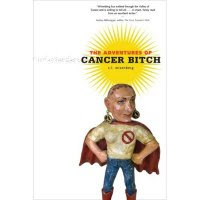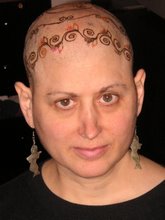
[by the immortal Posada]
I've been getting mammograms every six months for the remaining breast. Today I went again, and the procedure is that after the mammogram, you're led to the radiology lair and sit in the radiologist's office and talk to her. The radiologist I saw today was seemed to be in her 30s and spoke without pretense. She was happy because the images showed that the (micro)calcifications, which are tiny specks of calcium that could indicate cancer but probably don't, have looked the same in all the mammograms in the past few years. So that means that nothing has changed. OK, it means that probably nothing has changed because you can't see every little thing that's going on.
I've had calcifications for a while--for years, in fact, before I was diagnosed. So I asked her if she could look at the calcifications in my cancer mammograms and compare them to the pre-cancer mammograms. My idea was that she could say, Aha, these calcifications from 2005 developed into the cancer of 2006/7, you can see that in retrospect. And then that would shed light on the specks of July 2010.
So she went through the images and arranged them on her light board and looked through her magic binoculars to see them better and said you couldn't learn anything from the comparison.It seems that the calcifications appeared
next to the tumors (or masses, as they say in the biz) but did not turn into them. She also said she had other customers waiting and indicated the folders on her desk. OK, she said patients, not customers.
She told me if I was really worried that I could have a biopsy but it wasn't necessary or that I could come in for a mammogram in six months instead of a year.
I had asked her to do this extra digging because I had this idea of calcium specks as little seeds that could turn into cancer, but that seems to be wrong.
Dr. Susan Love tells us:
Microcalcifications, as we call these specks, are usually the result of normal wear and tear on your breasts, but 20 percent of the time they're an indication of cancer or of the precancer ductal carcinoma in situ (DCIS). If the film shows only a few very tiny specks arranged in tight clusters, then it's more likely to be something wrong that can fit into the tiny ducts. If the specks are scattered and larger in size, they're more likely to be benign and harmless.The California Pacific Medical Center tells us:
"Benign" calcifications in the breast do not become malignant. Malignant calcifications are malignant from the time they first appear. When the radiologist assigns calcifications to a "probably benign" category, the risk of malignancy is considered to be less than 2%.My specks are scattered and the radiologist didn't seem bothered by them. She gave me a piece of paper showing the mammogram results as "benign appearing (not malignant) stable." The surgeon smiled at the results when she popped in (standing the whole time). In all everyone seemed happy and cheery with the mammograms, just stopping short of congratulating me on the films' unchanged nature, the way they did when we found out that the cancer hadn't crept up into my lymph nodes.
Aw shucks, it was nothing.
Still, nobody knows anything for sure sure, and though the physician's assistant said it was great that the cancer hadn't come back after 3.5 years, when I asked him about estrogen-sensitive tumors like I had, he said that they're usually slow-growing and are more likely to come back after 15 or 20 years than right away. I was thinking of CJ, who died last summer after having had a mastectomy and no chemo. She said that she thought she should have had chemo. She did have some good years, I think about eight, and then a couple of bad ones at the end, with the cancer growing in her brain and bones. She was working as long as she could, as a school librarian, even when she was nearly blind.
It's fine to laugh at this stage 2-a breast cancer, just garden variety, no big deal, I didn't need that breast anyway, and to read about
someone with stage four whose bones were cracking at the end of her book (
The Red Devil) and then to find out, hey, she just wrote a book about spending a year in India, but the cancer--even though we say its name now, not just Big C, or that someone's Sick, or Very Sick--it is a death sentence, for some people, some of the time, we just don't have all the particulars in advance.




















